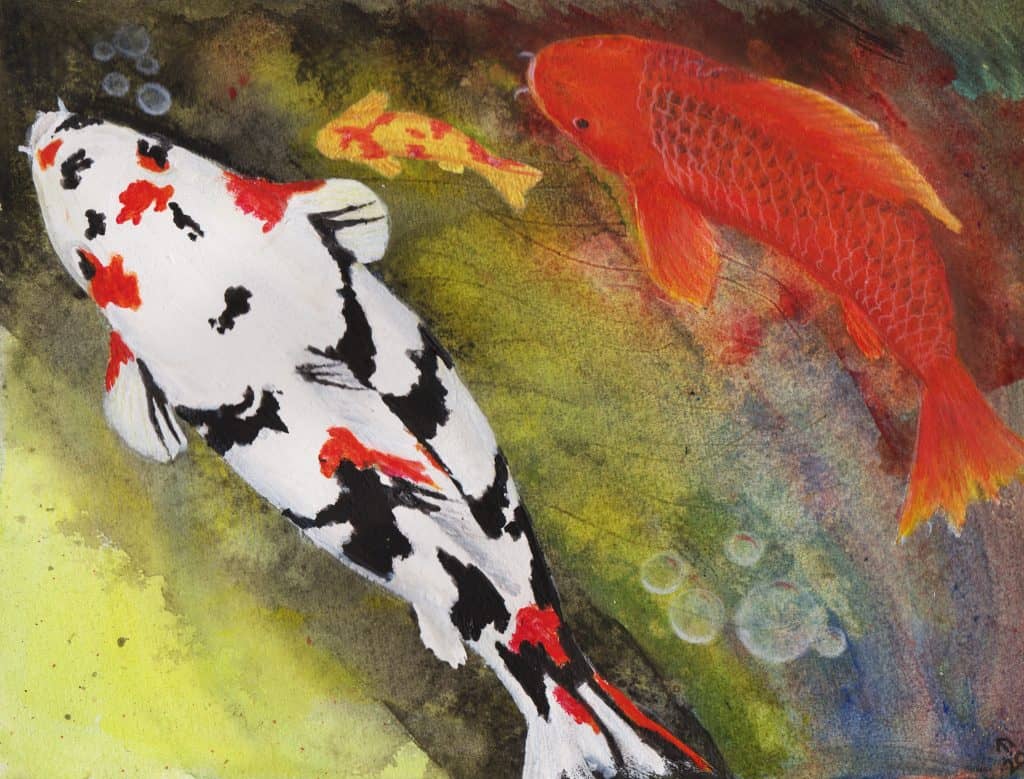
You are probably searching for how long for koi eggs to hatch, since you have a lovely little clutch of eggs and are eager to see them hatch. Congratulations!
Koi fry raising is a very rewarding hobby, and you will be rewarded with beautiful, thriving fish as they grow.
Find out how long it takes a koi fish to hatch and what you can expect once their eggs hatch by studying its lifecycle and breeding habits!
So, How Long?
Koi eggs hatch in four days on average.
The process may take up to a week, depending on the quality and temperature of your water.
Taking the breeding pair out of the original pond and placing them in a breeding tank or pond is fundamental if you plan on breeding Koi fish.
Once the eggs have been laid, the adult koi can be removed to prevent them from eating the fry.
It will also allow you to keep a better watch over your new batch of baby koi after they hatch.
In order to help you understand what to expect, let's take a look at the life cycle and breeding cycle of a koi.
https://www.grandkoi.com breeding generally occurs from February to May, though this may be subject to local climate conditions.
Most hobby breeders do not have access to a controlled environment and can breed for only a short period of time each year, so it is best to stick with this natural breeding season at first to avoid stressing your koi.
Place two koi in a separate breeding pond or tank with traits you enjoy or would like to see in other fish.
Plant plenty of plants or use a fry net to keep the eggs stable.
In the absence of lineage information on your fish or if they are a basic pet store variety, you should be aware that these kois babies may not resemble their parents. since they are typically not bred in, you may actually end up with hundreds of different traits within your clutch of eggs since they are typically not bred in conditions that are as closely monitored and controlled as traditional Japanese style breeders.
It is extremely important to choose mature and healthy koi before anything else.
During breeding, sick fish may be killed or hurt and may not even produce viable eggs.
A healthy fish is one that is older than three years, and a female that is older than three but less than six to eight years old.
They are at their most fertile and viable during this time.
In the breeding process, koi fish can be rather violent.
Koi males will nip and push each other and take part in head butting.
It's their way of forcing the females to lay their eggs on the plants or netting you provide.
You should remove an injured or overstressed koi from the pond and try to get it recovered with other koi if the first one fails to recover.
The two may simply not be compatible.
Your pond will soon contain eggs if they are compatible.
It is imperative to remove the male immediately following the breeding, which occurs over a number of sessions.
Females can also be removed from breeding and placed in nursery tanks for recovery.
You are now ready to hatch your eggs!
Koi Egg Care
To provide oxygen to your developing koi, add an airstone to your pond or tank once you have eggs.
You should generally let them be, assuming they have enough space and are kept at a comfortable temperature.
It will take around four days for them to hatch.
Koi should hatch in a week.
After the majority of eggs have been born, remove any dud eggs; these are unlikely to hatch.
After that, you can provide koi fry with the stepping stones needed to mature into vibrant, gorgeous new fish.
The best way to handle eggs found in your pond
A fish may decide to breed by itself at times.
In the wild, this is normal, but if you want your babies to survive, have the eggs removed from the pond and put them in a breeding tank with fry ropes or other tools for them to use while growing.
It is almost certain that many and most of the eggs will be consumed before hatching and most once they are born, as they will be small enough to be prey.
Adult koi have a natural reaction to babies in the water, and cannot be prevented from doing so.
Remove them so that they can mature and become large enough not to be food for your mature, larger koi.
The fry can be caught and moved if you leave your eggs in the pond or do not notice them until they hatch.
By doing this gently and carefully, you are giving the fish a chance to mature.
The fish should be moved to a pond or tank with similar parameters to their usual pond and something to hold on to until they are strong enough to swim.
The delicate plants will probably survive as long as you are gentle and patient with them, although you should expect some to lose.
